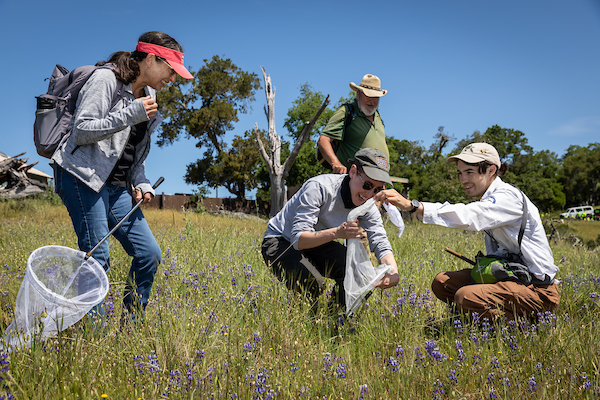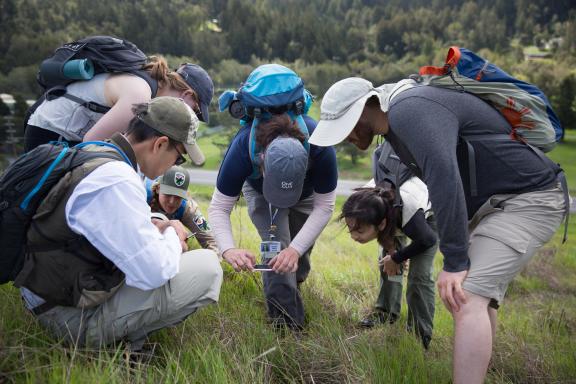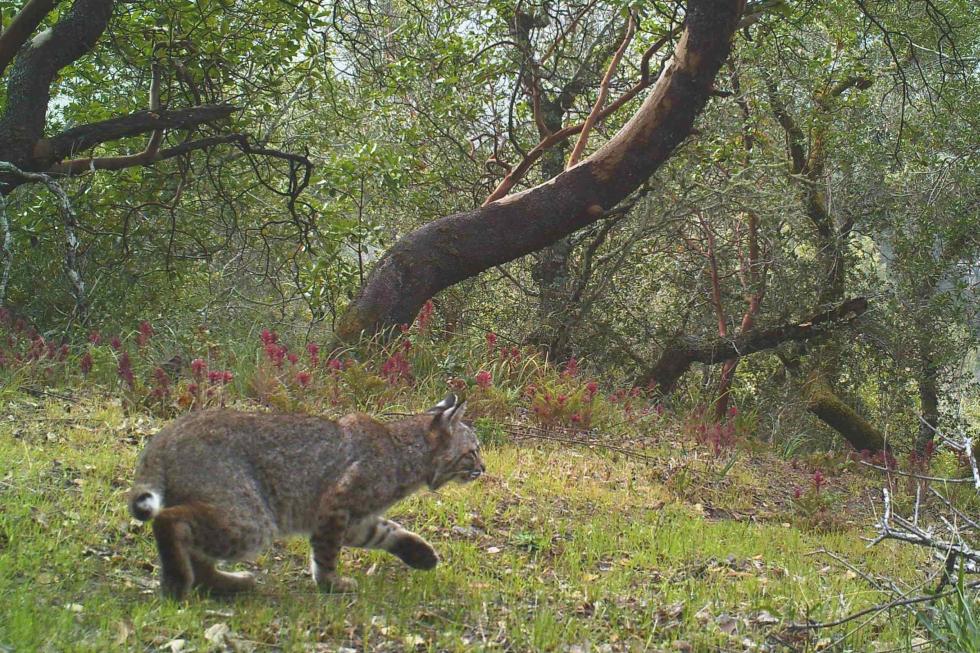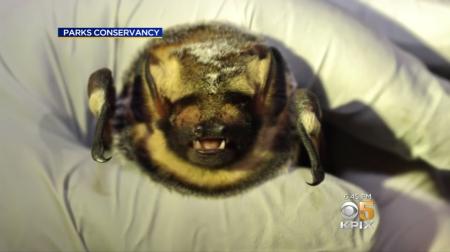Our Community Science Programs
One Tam's community science program blends landscape-scale science with community engagement and education. Community members participate in large-scale studies to inventory and monitor species and ecosystems in the Mt. Tamalpais region, helping to fill gaps in our knowledge about our local environment. These volunteer programs are an opportunity to learn new skills and to connect to our local public lands through participation in science. We couldn’t build this knowledge without our volunteers!
Currently, these programs include:
Marin Wildlife Watch – a mountain-wide study using motion-activated cameras to monitor mammal populations.
Tamalpais Bee Lab – studies of wild bees on public lands throughout Marin County.
California Giant Salamander Inventory - documenting this elusive species' population through crowd-sourced data.
Bioblitzes – one-day events where community members and scientists conduct a survey of a specific area to contribute to our knowledge of an area's biodiversity typically using the iNaturalist platform and/or making collections.
Bioquests – multi-day campaigns to document when and where specific species show up, typically using the iNaturalist platform.
This work is done in partnership with our One Tam agency partners and many other agencies, academic institutions, and non-profit conservation organizations. Our broad network also offers myriad programs with which we partner, including California Academy of Sciences, City Nature Challenge, and Xerxes Society, to name just a few. All our work feeds into larger, sometimes global, datasets and science initiatives. When you participate in one of our programs, you get to learn new skills and contribute to these important bodies of knowledge about the world.
Participate & Contact Us
Find opportunities to get involved on our calendar and get updates on these programs by signing up for our seasonal newsletter. Visit the links above for more information on specific programs. Please note that each program has its own structure, and availability and level of commitment required can vary by season and program size. Some programs also require training, which is provided free to volunteers.
Email communityscience@onetam.org for questions about our programs.
What is community science?
Community science means members of the public seeking to answer a question using science, often collaborating with professional scientists. This can look a lot of ways. A definition from our partner UC Davis Center for Community & Citizen Science explains:
"Community Science and Citizen Science engage members of the public to collaborate with professional scientists to conduct research-based investigations, engage in monitoring activities, collect data, and interpret results, and produce new knowledge used for natural resource management or basic research. This includes community science, which is community-driven research or monitoring in partnership with scientists."
Community Science or Citizen Science?
The term citizen science is often used interchangeably with community science. The word citizen, while not intended in this context as a political status, has been recognized by many programs as exclusionary and they have increasingly pivoted toward the more inclusive word community.
However, community science also has a distinct history as a community-driven practice rooted in communities engaging in science to seek environmental justice. Citizen science opportunities are often institution-driven initiatives that involve public participation. Both engage non-scientists in the process of science, for different purposes. Today, citizen science is increasingly seen as a subset of community science, and community science is increasingly being used as a broad term for multiple types of participatory science programs. See the resources below for more information.
At this time, many One Tam activities are driven by agency research needs. One Tam recognizes that to aid public understanding of our programs, we are using a term that carries a history distinct from the way we are using it.
While our current programs are created to serve specific community needs, our work is expanding access to informal science education and skill-building. We are actively engaging with community partners to bring these programs to a broader audience than traditional citizen science participation. We aspire to support more community-driven inquiry in our work in the future, in addition to fulfilling One Tam partner agency knowledge gaps.
Our volunteers also help shape our programs – we value and respond to the input of our volunteers and our programs reflect this. If you have ideas or feedback, let us know by completing this form.
Who can do community science?
Anyone! You do not need to have special knowledge or skills to start. We have activities that take place outside or in the comfort of your own home. A few of our activities are more appropriate for experienced volunteers. Anyone can gain this experience through participating and training is provided free to volunteers.
If you’re not sure about participating, please contact communityscience@onetam.org with your questions.
Are there age requirements?
At One Tam Community Science, we think science and curiosity are for everyone, so it really depends on the specific program and/or event.
For all programs:
Please read the specific event page and consider if you can safely complete the activity and have fun. Please reach out to communityscience@onetam.org if you have questions.
Participants 16 and under must have an adult guardian present for events on Marin Water or Marin County Parks jurisdiction.
Participants that are 17 & 18 years old must have a parent or guardian sign their volunteer agreement. This can be done ahead of time or at drop-off. Please email communityscience@onetam.org and to get the correct forms.
For Marin Wildlife Watch:
All Marin Wildlife Watch participants must be 13. This is a requirement of the terms of service for Wildlife Insights, the platform we use for the program.
For Tamalpais Bee Lab:
These events are generally appropriate for people aged 13 and up. We have hosted families with kids as young as 7 and everyone had a great time. Middle school and high school students routinely participate and return for more. Ultimately, you know your group the best.
For Bioblitzes:
Everyone from elders to children and infants (with an adult participant) is welcome to Bioblitz events. Please refer to the individual event page to make sure that the location and format will be fun for you and/or your group.
Each bioblitz is different. Some are aimed at seasoned naturalists and iNaturalist superstars and may involve detailed instruction from an expert. Others are joyous occasions for nature appreciation tailored at curious observers and those just getting started with iNaturalist. Some involve robust hiking to hard-to-access locations while others are a leisurely stroll in the park.
More resources
Other community science offerings from our One Tam partners include:
Golden Gate Raptor Observatory (Parks Conservancy)
Check out the work of partners in our network (list not exhaustive – ping us if you’d like to add):





